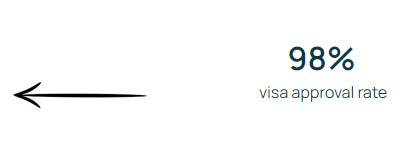Do i need indian visa for transit?
Find answers to your questions about visas when visiting India from the UK. Visa exemptions, short stay options and advice.
 Fast: Simplified, efficient process.
Fast: Simplified, efficient process.
 Security: information is protected.
Security: information is protected.
 Reliability: 98% approval rate.
Reliability: 98% approval rate.
 Assistance: 24/7 customer support.
Assistance: 24/7 customer support.


India, as a major air transit country, is often a frequent stopover for travellers from the UK to various destinations in Asia, Africa or Oceania. However, when it comes to making a stopover in India, it is important to consider visa requirements. A visa is an official document issued by a country that authorises travellers to enter and stay on its territory for a given period and under certain conditions. In this article, we'll take a brief look at what transit is and why travellers may need to make a stopover in India when travelling from the UK. We will also highlight the importance of a visa when stopping over in India, as travellers may wonder whether they need to obtain a transit visa. We'll look at the different categories of visa, including potential exemptions and short-stay visas, to give you the information you need to plan your stopover in India with peace of mind.
Transit visa for India: in brief
- Not required for single transits of less than 24 hours: Foreign nationals generally do not need a transit visa if they stay in the transit zone of the Indian airport and their stopover lasts less than 24 hours.
- Leaving the airport or extended transit: If you wish to leave the airport or if your stopover lasts longer than 24 hours, you will need to obtain a tourist visa, which allows you to leave the transit zone and visit India during your stopover.
- Types of transit visas: For short stopovers without leaving the airport, no visa is required. However, for longer stopovers or if you leave the transit zone, a tourist visa is required.
- Documents required: For a transit or tourist visa, you will need to provide documents such as your passport, flight ticket and proof of accommodation for the duration of your stay in India or in your final destination country.
- Online application: Indian visas, including transit and tourist visas, can be applied for online via official platforms, facilitating the process before your departure.


When you stop over in India from the UK, you may be able to benefit from an exemption from the transit visa requirement. This means that you can travel through India without having to obtain a specific visa for your short stay in transit. However, it is important to understand the conditions required to benefit from this exemption and the maximum length of time you can stay in transit in India without a visa.
Travellers in transit to India from the UK may be exempt from the visa requirement in the following cases:
To qualify for transit visa exemption, certain conditions must be met:
It is essential to note that if you leave the transit zone of the airport, or if you plan to stay in India for longer than permitted, you will need to obtain an appropriate short-stay visa.
If you are planning to leave the airport and explore India during your stopover, it is essential to obtain a short-stay visa. A short-stay visa allows you to stay in India for a set period of time to discover the country's cultural and natural wonders. There are various short-stay visa options available, such as the electronic visa (e-Visa) and the traditional visa. Here is the essential information on the requirements and steps to follow to obtain a short-stay visa for India.
Electronic visa (e-Visa): India offers an electronic visa, also known as e-Visa, which facilitates the visa application process. Here are some key points to know about the e-Visa:
You can apply for an e-Visa online via the Indian government's official visa website or via the service provider we recommend. Fill in the application form, upload the required documents (passport, recent photo, etc.) and pay the visa fee. Once approved, you will receive your e-Visa by e-mail, which you will need to present on arrival in India.
If you do not meet the eligibility criteria for an e-Visa, or if you prefer to opt for a traditional visa, you will need to submit your application through the relevant Indian embassy or consulate.
When planning a stopover in India from the UK, it's essential to consider a few practical tips to make your journey easier and ensure a hassle-free experience. Here are some useful recommendations to keep in mind:
The cost of an India transit visa for travellers can vary depending on several factors, such as the length of your stopover, the type of visa and any additional services requested.
To give you an idea of prices, here are a few examples:
The cost of a tourist e-Visa for India for a 30-day stay is around €25. A traditional visa could cost more than double that, depending on the additional services requested.
In general, it is not recommended to try to obtain an India transit visa on arrival.
Here's why:
Find out if your question has been answered in the list below
If you stay in the transit zone of the airport and do not leave India, you may be exempt from the transit visa requirement. However, if you wish to leave the airport and explore India during your stopover, you will need to obtain a short-stay visa.
To benefit from the transit visa exemption, you must have an onward ticket proving that you will leave India within the required time. In addition, the maximum time allowed for visa-free transit in India varies according to your mode of transport, generally between 24 and 72 hours for air transit.
For a stopover in India, you have two short-stay visa options: The e-Visa and the traditional visa. The e-Visa is available for certain nationalities, including the UK, and can be obtained online. There are specific categories such as tourist, business and medical e-Visa. If you are not eligible for the e-Visa or prefer the traditional visa, you will need to submit an application to the relevant Indian embassy or consulate.